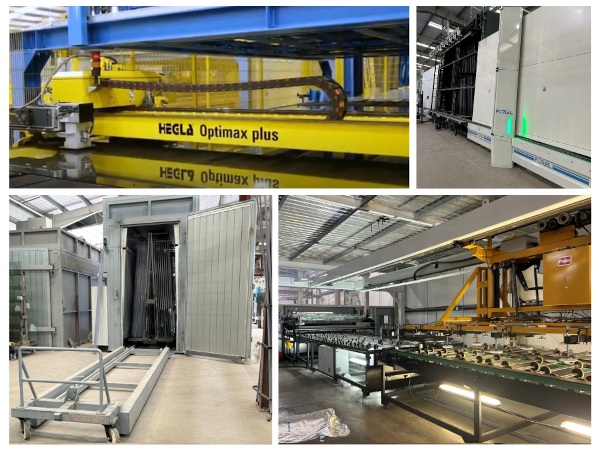Date: 8 July 2013
The route to Armour Sealed Units passes through the centre of a quiet residential area in Bristol and ends in a cul-de-sac.
An older building, measuring almost 250 square metres with the white-red company logo can be found at the end of this cul-de-sac. Company founder and owner Peter Crowley explains how his desire for an insulating glass line in the small factory was fulfilled thanks to Bystronic glass and tells of the challenges that had to be overcome.
.jpg)
Insulating glass line at Armour Sealed Units in Bristol
Peter Crowley founded Armour Sealed Units Ltd. in 1983 and, since then, has been able to acquire numerous regular customers from the surrounding area for his insulating glass. Two years later, the family company – his son is the head of production and his wife takes care of the office work – moved to the current location. Initially, the insulating glass production was largely performed on a manual basis. Later, it was only the sealing that was performed manually. “For a long time, I could not imagine that a complete insulating glass line including a sealing robot would fit in our small factory”, explains Peter. However, the entrepreneur was fully aware that he needed to invest in his production facility and modernise the old machinery in order to remain competitive and continue to be able to produce premium products that meet the current legal requirements.
.jpg)
Company’s founder Peter Crowley (right) and his son
What does not fit is made to fit
Following intensive meetings with Steve Powell, Head of the Bystronic glass Sales and Service Subsidiary in Great Britain, it was decided that everything that was unable to fit into the factory at first glance would be adapted by Bystronic glass. Subsequently, Armour Sealed Units received an insulating glass line consisting of a washing machine, air cushion conveyors, a station for glass inspection and frame positioning assembly, a gas-filling press robot as well as a compact sealing robot in spring 2012. “Bystronic glass was the only provider that was able to offer me a fully-equipped insulating glass line for my factory that only measures about 20 metres in length”, explains Peter and goes on to say: “What most impressed me was the fact that Steve did not want to force a standard solution full of compromises upon us; he fully recognised our production needs and the on-site conditions.”
.jpg)
Being Head of Production Peter Crowley’s son is working in the family company, too.
A completely tailor-made solution
The insulating glass line is configured in an extremely individual manner but the delivery of the unit was every bit as unusual: “We had to arrange for all parking spaces in the access roads of the residential area to be cordoned off in order to ensure that the large HGV carrying the machines was able to fit through the narrow streets and get around the bends”, reports Steve. Luckily, the residents are accustomed to such things: The arrival and departure of, admittedly significantly smaller, HGVs carrying glass and insulating glass units takes place many times every week. Since 1985, this has represented an enormous relief as a dairy that was accessed by HGVs many times every day was based where Armour Sealed Units is now located. “The older residents may even be able to remember the times when a fire station was located on the current Armour Sealed Units premises”, reports Peter Crowley upon the history of his company building.
.jpg)
The insulating glass line contains a station for glass inspection and frame positioning.
But now back to the present: Peter is completely satisfied, both with his tailor-made insulating glass line and with the Bystronic glass service “that is unrivalled in Great Britain”, as he emphasises. As expected, the new insulating glass line has made the production of Armour Sealed Units significantly more efficient. The company produces up to 4,000 insulating glass units every week – completely in accordance with the customer requirements: Rectangular and shaped units with low-E coated, tempered or decorative glass as well as laminated glass and units with muntin bars come off the production line. In order to ensure better thermal insulation, 90 percent of the units are filled with gas, which is the standard in Great Britain. Peter is happy that, in Bystronic glass and its cooperative partner Hegla, he has two companies by his side that consider excellent service and quality to be just as important as he does.







Add new comment